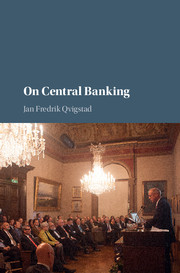Book contents
1 - On Keeping Promises
Published online by Cambridge University Press: 05 July 2016
Summary
Why Is Keeping Promises So Difficult?
This house, which now belongs to the Norwegian Academy of Science and Letters, was built by Hans Rasmus Astrup in 1886–1887. Astrup was an entrepreneur. At the age of 20, he left Norway for Barcelona on a ship laden with a cargo of dried cod. He gradually built up a large trading business and later became an industrialist, not unlike businessmen of our own era.
For innovators and the business sector, a stable operating environment has always been important, providing a foundation for adaptation, economic growth, and social progress. A stable value of money is also a component of this foundation.
We were taught as children to keep our promises. If we made a promise, we had to make good on it. But we were also taught that we should not promise too much. If we do not keep our word, others lose confidence in us and our credibility takes a toll. In recent months, we have witnessed that this is of particular importance for the financial system. A proximate example is the situation in our neighboring country Iceland.
The value of confidence and credibility has been the subject of extensive analysis in many fields, including jurisprudence and the social sciences. And the conclusion is clear – progress can be achieved if promises are kept.
If keeping promises is clearly beneficial, why is it then so difficult? The expressions “empty promises” and “empty threats” reflect the temptation to renege. The social scientist and philosopher Jon Elster writes in his book Ulysses and the Sirens about weakness of will, shifting preferences over time, and the complexities of human nature. This is familiar ground. As early as 1960, the economist Thomas Schelling discussed similar issues in analyses for which he was awarded the Nobel Prize in economics. According to Schelling, a credible threat can be difficult to establish when realizing the threat involves costs for all the parties involved. A promise or a threat will be more credible if the promisor lets himself be bound to the mast.
Two other economists carried out groundbreaking work when they applied Schelling's analysis to economic issues.
- Type
- Chapter
- Information
- On Central Banking , pp. 1 - 31Publisher: Cambridge University PressPrint publication year: 2016
- 1
- Cited by

